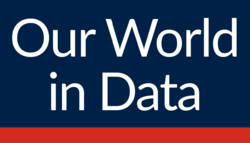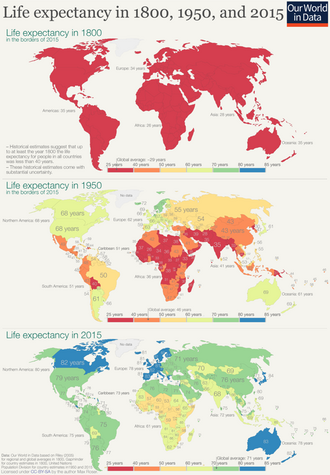Organization:Our World in Data
 | |
| Type of business | Non-profit affiliated with the University of Oxford |
|---|---|
| Headquarters | Oxford, England |
| Owner | Global Change Data Lab |
| Founder(s) | Max Roser |
| Revenue | |
| Website | {{{1}}} |
| Commercial | No |
| Launched | May 2013[2] |
| Current status | Active |
Our World in Data (OWID) is a scientific online publication that focuses on large global problems such as poverty, disease, hunger, war, climate change, population growth, existential risks, and inequality.
It is a project of the Global Change Data Lab, a registered charity in England and Wales,[3] and was founded by Max Roser, a social historian and development economist. The research team is based at the University of Oxford.[4] The organization is chaired by Hetan Shah.
Content
Our World in Data uses interactive charts and maps to illustrate research findings, often taking a long-term view to show how global living conditions have changed over time.
-
Compilation of graphs from the organization, showing the overall global percentages of the last two centuries, in six factors: extreme poverty, democracy, basic education, vaccination, literacy, and child mortality
-
Global CO
2 emissions by world region since 1750
-
Cartogram showing the distribution of the global population. Each of the 15,266 pixels represents the home country of 500,000 people.
Template:Owidslider As of April 2024, Our World in Data categorize their charts and articles by the following topics on their website:[5]
- Population and Demographic Change
- Health
- Energy and Environment
- Food and Agriculture
- Poverty and Economic Development
- Education and Knowledge
- Innovation and Technological Change
- Living Conditions, Community, and Wellbeing
- Human Rights and Democracy
- Violence and War
History
Roser began his work on the project in 2011,[6] adding a research team at the University of Oxford later on. In the first years, Roser developed the publication together with inequality researcher Sir Tony Atkinson.[6] Hannah Ritchie joined in 2017 and became Head of Research.[7] Edouard Mathieu joined in 2020 and became Head of Data.[8] The organization began the COVID-19 pandemic with six staff members, and grew to 20 by late 2021.[9][10]
In 2019, Our World in Data won the Lovie Award, a European web award,[11] and was one of three nonprofit organizations in Y Combinator's Winter 2019 cohort.[12][13]
Beginning in 2020, Our World in Data added an emphasis on publishing global data and research on the COVID-19 pandemic:
- They created and maintained a worldwide database on vaccinations for COVID-19, which was used as the source for data published by the World Health Organization,[14] researchers and other international organizations,[15][16] journals,[17] and numerous newspapers.[18][19][20][21][22][23][24][25][26]
- Similarly, the team built and maintained a global dataset on COVID-19 testing which was used by the United Nations, the White House, the World Health Organization, and epidemiologists and researchers,[27][28][29] and also published data such as hospitalizations and computations of excess deaths.[30]
In 2021, the team began campaigning for the International Energy Agency to make the data it collects from national governments publicly available.[31]
Funding and collaborations

Global Change Data Lab, the non-profit that publishes Our World in Data and the open-access data tools that make the online publication possible, is funded through a mix of grants, sponsors, and reader donations.[32]
- The first grant to support the research project was given by the Nuffield Foundation, a London-based foundation focused on social policy.[33]
- Other grantors supporting the project have included the Quadrature Climate Foundation, the Bill and Melinda Gates Foundation, and a grant from German philanthropist Susanne Klatten.[34] In the past, Our World in Data has also received grants from the World Health Organization, the Department of Health and Social Care in the United Kingdom, and the Effective Altruism Meta Fund.[35]
- Reader donations are also a major source of funding. In 2020, more than 3,000 individuals supported the project,[36] exceeding 4,000 donors by 2023. The list of donors includes Jamie Metzl and YouTuber Hank Green.[35]
The research team collaborated with the science YouTube channel Kurzgesagt.[37][38]
In the coronavirus pandemic, the team partnered with epidemiologists from Harvard's Chan School of Public Health and the Robert Koch Institute to study countries that have responded successfully in the early phase of the pandemic.[39] Janine Aron and John Muellbauer worked with OWID to research excess mortality during the pandemic.[40]
In 2022, FTX's Future Fund offered Our World in Data a $7.5 million grant to support their activities. Max Roser told Fortune that Our World in Data's board of trustees ultimately rejected the grant money after conducting due diligence and other checks.[41]
Usage
In 2021, the Our World in Data website had 89 million unique visitors.[42]
Our World in Data has been cited in academic scientific journals,[43][44][45][46][47] medicine and global health journals,[48][49] and social science journals.[50] The Washington Post, The New York Times,[51] and The Economist[52] have used Our World in Data as a source.
The site uses permissive licenses to allow others to copy, modify, and distribute the work (CC BY for content and the MIT License for software).[53]
See also
- Gapminder Foundation
References
- ↑ "TRUSTEES' ANNUAL REPORT AND FINANCIAL STATEMENTS FOR THE YEAR ENDED 31 DECEMBER 2023". GLOBAL CHANGE DATA LAB. https://assets.ourworldindata.org/uploads/2024/10/2023%20Annual%20Report.pdf.
- ↑ Roser, Max. "History of Our World in Data". https://ourworldindata.org/history-of-our-world-in-data.
- ↑ "About". https://ourworldindata.org/about.
- ↑ "The Oxford Martin Programme on Global Development". https://www.oxfordmartin.ox.ac.uk/global-development/.
- ↑ Data, Our World in; Roser, Max (2024-03-25). "OWID Homepage". Our World in Data. https://ourworldindata.org/.
- ↑ 6.0 6.1 "History of Our World in Data". https://ourworldindata.org/history-of-our-world-in-data.
- ↑ Vaughan, Adam. "Hannah Ritchie interview: The woman giving covid-19 data to the world" (in en-US). https://www.newscientist.com/article/2278673-hannah-ritchie-interview-the-woman-giving-covid-19-data-to-the-world/.
- ↑ "Edouard Mathieu: An Open Data Approach to Solving the World's Problems" (in en-US). https://ten7.com/podcast/episode/edouard-mathieu-open-data-approach-solving-worlds-problems.
- ↑ Wiblin, Robert. "Max Roser on building the world's first great source of COVID-19 data at Our World in Data" (in en-US). https://80000hours.org/podcast/episodes/max-roser-our-world-in-data/.
- ↑ "Our World in Data - Team". https://ourworldindata.org/team.
- ↑ "Meet The 2019 Lovie Awards Special Achievement Winners" (in en-US). 2019-10-07. https://www.lovieawards.eu/features/2019-winners-announced/.
- ↑ "YC-backed Our World in Data wants you to know what's changing about the planet". 23 January 2019. https://techcrunch.com/2019/01/23/our-world-in-data/.
- ↑ "Our World in Data is at Y Combinator". https://ourworldindata.org/owid-at-ycombinator.
- ↑ "WHO COVID-19 Explorer". https://worldhealthorg.shinyapps.io/covid/.
- ↑ "COVID-19 Task Force Dashboard". https://data.covid19taskforce.com/data.
- ↑ Ledford, Heidi (2021-06-04). "Six months of COVID vaccines: what 1.7 billion doses have taught scientists" (in en). Nature 594 (7862): 164–167. doi:10.1038/d41586-021-01505-x. PMID 34089016. Bibcode: 2021Natur.594..164L. https://www.nature.com/articles/d41586-021-01505-x. Retrieved 21 July 2021.
- ↑ Mathieu, Edouard; Ritchie, Hannah; Ortiz-Ospina, Esteban; Roser, Max; Hasell, Joe; Appel, Cameron; Giattino, Charlie; Rodés-Guirao, Lucas (2021-05-10). "A global database of COVID-19 vaccinations" (in en). Nature Human Behaviour 5 (7): 947–953. doi:10.1038/s41562-021-01122-8. ISSN 2397-3374. PMID 33972767. https://www.nature.com/articles/s41562-021-01122-8. Retrieved 21 July 2021.
- ↑ Visual, F. T.; team, Data Journalism. "Covid-19 vaccine tracker: the global race to vaccinate" (in en-gb). https://ig.ft.com/coronavirus-vaccine-tracker/.
- ↑ Holder, Josh (2021-01-29). "Tracking Coronavirus Vaccinations Around the World" (in en-US). The New York Times. ISSN 0362-4331. https://www.nytimes.com/interactive/2021/world/covid-vaccinations-tracker.html.
- ↑ Holder, Josh (29 January 2021). "Tracking Coronavirus Vaccinations Around the World" (in en-US). The New York Times. ISSN 0362-4331. https://www.nytimes.com/interactive/2021/world/covid-vaccinations-tracker.html.
- ↑ Neville, Sarah (2022-01-19). "Pandemic exposes a world of healthcare inequalities". Financial Times. https://www.ft.com/content/258588c0-93c8-4978-8e73-5eb28d43f12a.
- ↑ Rodés, Andrea (18 July 2021). "'Our World in Data': ¿El mundo va a mejor o a peor?" (in es). https://cronicaglobal.elespanol.com/pensamiento/espejos-de-hoy/our-world-in-data-el-mundo-va-mejor-peor_510594_102.html.
- ↑ "Covid-19 vaccine tracker: View vaccinations by country" (in en). https://www.cnn.com/interactive/2021/health/global-covid-vaccinations/.
- ↑ Millán, Víctor (2021-04-05). "3100 gráficos de casi 300 temas distintos: así es Our World in Data, la web imprescindible para entender lo que ha pasado y está pasando" (in es). https://www.xataka.com/investigacion/our-world-in-data-web-imprescindible-para-entender-que-ha-pasado-esta-pasando-2020-2021.
- ↑ "Max Roser on building the world's best source of COVID-19 data at Our World in Data" (in en-US). https://80000hours.org/podcast/episodes/max-roser-our-world-in-data/.
- ↑ "Most governments are not yet on track to hit their vaccine roll-out targets". The Economist. 2021-01-06. ISSN 0013-0613. https://www.economist.com/graphic-detail/2021/01/06/most-governments-are-not-yet-on-track-to-hit-their-vaccine-roll-out-targets.
- ↑ Subbaraman, Nidhi (2020-03-23). "Coronavirus tests: researchers chase new diagnostics to fight the pandemic" (in en). Nature. doi:10.1038/d41586-020-00827-6. PMID 32205872. https://www.nature.com/articles/d41586-020-00827-6. Retrieved 8 July 2020.
- ↑ Yan, Holly (13 May 2020). "Trump says the US leads the world in testing. But it's far behind in testing per capita, studies show". https://www.cnn.com/2020/05/12/health/us-coronavirus-testing-per-capita/index.html.
- ↑ Hasell, Joe; Mathieu, Edouard; Beltekian, Diana; Macdonald, Bobbie; Giattino, Charlie; Ortiz-Ospina, Esteban; Roser, Max; Ritchie, Hannah (2020-10-08). "A cross-country database of COVID-19 testing" (in en). Scientific Data 7 (1): 345. doi:10.1038/s41597-020-00688-8. ISSN 2052-4463. PMID 33033256. PMC 7545176. https://www.nature.com/articles/s41597-020-00688-8.epdf?sharing_token=DhVSer4fwMaMn21PlrIsjNRgN0jAjWel9jnR3ZoTv0PTrf0-71MWJ-TVId3NUEQUJCLb8G87BoUdAuW8R1_iiTGud8PFK9p5JC67ZMJAXpsgS8kKXhMu3mB2ZZLC5N3NtSS3xfkaXYRTu-Sslh-oREBAjsFqLo8llDsJyPwH6bM=. Retrieved 29 April 2021.
- ↑ "covid-19-data/public/data at master · owid/covid-19-data" (in en). https://github.com/owid/covid-19-data.
- ↑ Ritchie, Hannah (5 October 2021). "Covid's lessons for climate, sustainability and more from Our World in Data". Nature 598 (7879): 9. doi:10.1038/d41586-021-02691-4. ISSN 1476-4687. PMID 34611360. Bibcode: 2021Natur.598....9R. https://media.nature.com/original/magazine-assets/d41586-021-02691-4/d41586-021-02691-4.pdf. Retrieved 2021-11-10.

- ↑ "How We're Funded". https://ourworldindata.org/funding.
- ↑ "Our world in data" (in en-GB). https://www.nuffieldfoundation.org/project/our-world-in-data.
- ↑ "How We're Funded". https://ourworldindata.org/funding.
- ↑ 35.0 35.1 "How We're Funded". https://ourworldindata.org/funding.
- ↑ Global Change Data Lab, Annual Report 2020 , Page 7.
- ↑ Yau, Nathan. "Kurzgesagt" (in en). https://flowingdata.com/tag/kurzgesagt/.
- ↑ Whisner, Mary. "Library Guides: Law in the Time of COVID-19: Medical & Nonlegal Information" (in en). https://guides.lib.uw.edu/law/covid19/med.
- ↑ "How experts use data to identify emerging COVID-19 success stories". https://ourworldindata.org/identify-covid-exemplars.
- ↑ "A pandemic primer on excess mortality statistics and their comparability across countries". https://ourworldindata.org/covid-excess-mortality.
- ↑ Kahn, Jeremy (2022-11-15). "Is the collapse of Bankman-Fried's FTX crypto empire the end of Effective Altruism?" (in en). https://fortune.com/2022/11/14/bankman-fried-ftx-collapse-threatens-effective-altruism-billions-charity-philanthropy/.
- ↑ "Our Audience & Coverage". https://ourworldindata.org/coverage.
- ↑ Nagendra, Harini; DeFries, Ruth (2017-04-21). "Ecosystem management as a wicked problem". Science 356 (6335): 265–270. doi:10.1126/science.aal1950. ISSN 0036-8075. PMID 28428392. Bibcode: 2017Sci...356..265D.
- ↑ Lamentowicz, M.; Kołaczek, P.; Laggoun-Défarge, F.; Kaliszan, K.; Jassey, V. E. J.; Buttler, A.; Gilbert, D.; Lapshina, E. et al. (2016-12-20). "Anthropogenic- and natural sources of dust in peatland during the Anthropocene". Scientific Reports 6. doi:10.1038/srep38731. PMID 27995953. Bibcode: 2016NatSR...638731F.
- ↑ Topol, Eric J. (2019). "High-performance medicine: the convergence of human and artificial intelligence". Nature Medicine 25 (1): 44–56. doi:10.1038/s41591-018-0300-7. ISSN 1546-170X. PMID 30617339.
- ↑ Liu, Xin; Xu, Xun; Vigouroux, Yves; Wettberg, Eric von; Sutton, Tim; Colmer, Timothy D.; Siddique, Kadambot H. M.; Nguyen, Henry T. et al. (May 2019). "Resequencing of 429 chickpea accessions from 45 countries provides insights into genome diversity, domestication and agronomic traits". Nature Genetics 51 (5): 857–864. doi:10.1038/s41588-019-0401-3. ISSN 1546-1718. PMID 31036963. http://oar.icrisat.org/11191/1/2019_NatureGenetics_chickpeas.pdf. Retrieved 25 March 2020.
- ↑ Levitt, Jonathan M.; Levitt, Michael (2017-06-20). "Future of fundamental discovery in US biomedical research". Proceedings of the National Academy of Sciences 114 (25): 6498–6503. doi:10.1073/pnas.1609996114. ISSN 0027-8424. PMID 28584129. Bibcode: 2017PNAS..114.6498L.
- ↑ Lartey, Anna; Shetty, Prakash; Wijesinha-Bettoni, Ramani; Singh, Sudhvir; Stordalen, Gunhild Anker; Webb, Patrick (2018-06-13). "Hunger and malnutrition in the 21st century". BMJ 361. doi:10.1136/bmj.k2238. ISSN 0959-8138. PMID 29898884.
- ↑ Yamin, Alicia Ely; Uprimny, Rodrigo; Periago, Mirta Roses; Ooms, Gorik; Koh, Howard; Hossain, Sara; Goosby, Eric; Evans, Timothy Grant et al. (2019-05-04). "The legal determinants of health: harnessing the power of law for global health and sustainable development" (in en). The Lancet 393 (10183): 1857–1910. doi:10.1016/S0140-6736(19)30233-8. ISSN 0140-6736. PMID 31053306.
- ↑ Weil, David; Storeygard, Adam; Squires, Tim; Henderson, J. Vernon (2018-02-01). "The Global Distribution of Economic Activity: Nature, History, and the Role of Trade". The Quarterly Journal of Economics 133 (1): 357–406. doi:10.1093/qje/qjx030. ISSN 0033-5533. PMID 31798191.
- ↑ Frakt, Austin (2018-05-14). "Medical Mystery: Something Happened to U.S. Health Spending After 1980". The New York Times. ISSN 0362-4331. https://www.nytimes.com/2018/05/14/upshot/medical-mystery-health-spending-1980.html.
- ↑ "Africa is on track to be declared polio-free". The Economist. 2019-08-21. ISSN 0013-0613. https://www.economist.com/graphic-detail/2019/08/21/africa-is-on-track-to-be-declared-polio-free.
- ↑ "Our World in Data". 27 Feb 2023. https://ourworldindata.org/. (footer)
External links
- No URL found. Please specify a URL here or add one to Wikidata.
- History of Our World in Data
 |



